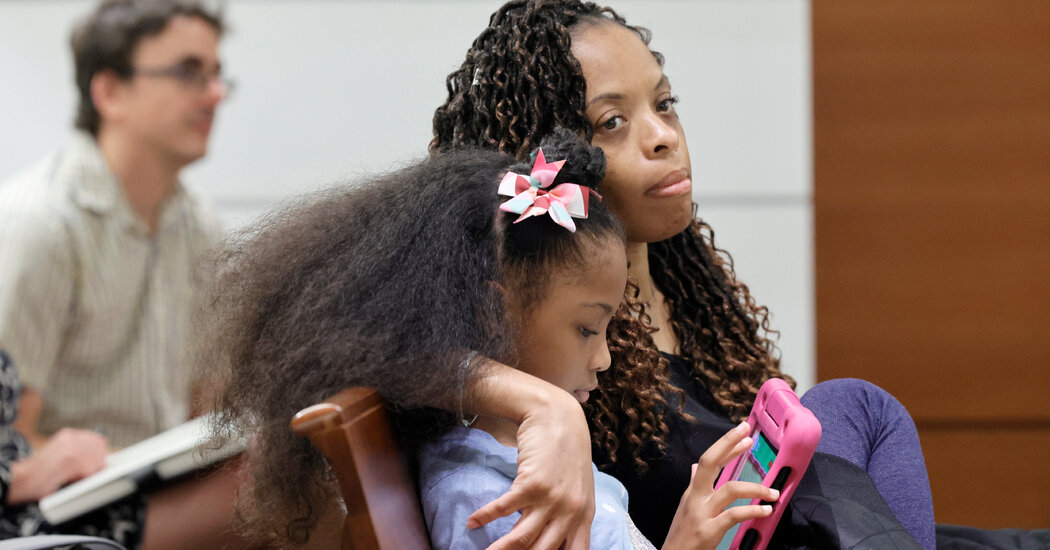A Florida jury awarded $800,000 in damages to a 7-year-old girl on Wednesday for the suffering and mental anguish caused when a Chicken McNugget fell on her thigh, causing a second-degree burn.
The burn occurred in 2019 when she visited a McDonald’s at the age of 4, and the case drew comparisons to a famous and successful lawsuit against the fast food chain by a woman who was scalded by hot coffee more than 30 years ago.
The Broward County jury awards the girl, Olivia Caraballo, punitive damages for pain, suffering and other forms of mental anguish: $400,000 for the pain she endured and an additional $400,000 for any future suffering resulting from the injury, according to court documents. Lawyers for the family had asked for $15 million.
The lawsuit was brought by Olivia’s parents, Philana Holmes and Humberto Caraballo Estevez, against McDonald’s and Upchurch Foods, the franchise operator in Tamarac, Fla. In May, a separate jury ruled that the two companies were liable for failing to provide reasonable instructions or warnings — on packaging, for example — about the risks of injury that could result from a Chicken McNuggets meal, which comes with chunks of white chicken meat.
As of Thursday, it was not yet clear whether lawyers from McDonald’s and Upchurch Foods would appeal the decision. McDonald’s lawyers declined to comment. Upchurch Foods lawyers did not immediately respond to multiple requests for comment. Under Florida law, they have 15 days to request a new trial or 30 days to appeal.
Jordan Redavid, the family’s lead attorney, said the jury’s decision was “full justice” for Olivia.
“For years the defendants said we had no case and they were not liable,” said Mr Redavid. The damages awarded were far more than the $156,000 McDonald’s attorneys had suggested to the jury in their closing remarks, he added.
In August 2019, Mrs. Holmes ordered a six-piece Chicken McNuggets Happy Meal for Olivia at a McDonald’s drive-through in Tamarac, a town northwest of Fort Lauderdale, Florida. After she handed the nuggets to her daughter in the back seat, a piece fell into Olivia’s lap, leaving her thigh “disfigured and scarred,” according to the initial lawsuit.
On Thursday, Ms Holmes said in a telephone interview that she was “happy with the decision” and was pleased that the jury took into account her daughter’s pain.
“I just wanted Olivia’s voice to be heard,” Mrs. Holmes said.
The court will oversee the disbursement of the money awarded to the child, Mr Redavid said, possibly through a court-appointed guardian who will suggest how the money should be distributed. The money will most likely be placed in an investment account until Olivia reaches adulthood, he added.
The case drew comparisons to a well-known lawsuit, which also involved McDonald’s, by a woman who burned herself on the fast food restaurant’s coffee. In 1992, Stella Liebeck, then 79, suffered severe burns after spilling the morning brew on her lap at a McDonald’s drive-through in Albuquerque.
Ms. Liebeck’s lawsuit initially resulted in a whopping $2.9 million in damages. It turned the McDonald’s case into a byword for outrageous litigation, said Prof. Ryan Calo, who teaches tort law at the University of Washington School of Law.
Professor Calo said the hot coffee lawsuit was similar to a typical tort law case and had more merit than the public debate would have allowed, as court proceedings had revealed that the company typically served its coffee at between 180 and 190 degrees. The prosecution, who was found partially liable by the jury, nevertheless managed, with some success, to change the practices of a sprawling corporate giant, he said. A judge later reduced Ms. Liebeck’s award to about $640,000, deeming it a more proportionate number, he added.
Mr Redavid acknowledged that the two McDonald’s cases looked similar at first glance: a burnt customer, a glowing object, a large payout from McDonald’s. But circumstances were different, he said. Mrs. Liebeck’s critics said she should have known coffee was hot. But it was hard to find fault with Olivia, a 4-year-old girl, because she didn’t expect how hot a Chicken McNugget could be.
“This isn’t the infamous hot coffee business; this is Olivia’s case,” Mr Redavid and his lawyers wrote in a statement following the jury’s verdict.
Since the 1992 case, McDonald’s and many other coffee shops have resorted to putting larger labels on their products with more direct warnings.
As for the Chicken McNuggets, McDonald’s does not currently issue warning labels.
Mrs. Holmes hopes so. “Hopefully McDonald’s will change their Happy Meal boxes now,” she said, “to add a label or a warning that the food inside is straight from the fryer.”

